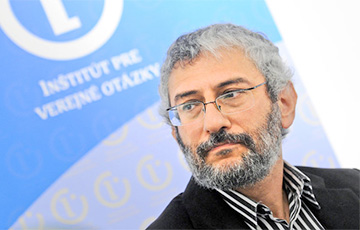European Union, Lukashenka, and fate of Belarusian democracy
- Gregory Mesezhnikov
- 15.02.2016, 16:17
- 4,066

The European Union is making the same mistake with regard to Belarus.
The visit of Political Directors of the Ministries of Foreign Affairs of the Visegrad Group to Minsk (V4), details of which appeared on charter97.org website a few days ago, could not fail to attract the attention of observers, watching the development of events in relations between Belarus and the European Union .
The delegation of the Visegrad diplomats met in Minsk with the Minister of Foreign Affairs Uladzimir Makei and his deputy Alena Kupchyna. According to the communique, published by the Belarus Foreign Ministry, "European diplomats noted the readiness of the Republic of Belarus to continue contacts on the subject of human rights both directly between Belarus and the European Union and using the government agreed programs that promote the development by the UN agencies."
During the meeting, the communique also said, the parties "discussed issues of cooperation between Belarus and the Visegrad Group, the prospects for the normalization of relations between Belarus and the European Union, as well as the number of items of the international and regional agenda."
What to think of the visit and what may the overtly optimistic tone of the Belarusian Foreign Ministry posts, undoubtedly agreed with the Visegrad guests, indicate? Given that it was not the first such visit of the V4 representatives to Minsk (recently, there came Visegrad diplomats of higher rank, such as deputy ministers, secretaries of state), the current meeting of political directors of the Foreign Ministries of the Czech Republic, Slovakia, Hungary and Poland with the leadership of the Belarusian Foreign Ministry can be considered as yet another link in the development of so-called "pragmatic" policy of the European Union in its relations with Belarus.
There is a certain irony in the fact that the V4 countries which engaged recently in a strong dispute, if not confrontation, with their Western EU partners on the issue of refugees, became the agents (and I must say, very willing ones) of the new, "corrected" EU line in relations with Belarus. According to information leaking from the European political lobbies, the European Union is currently discussing the possibility of almost complete abolition of the current sanctions against the Belarusian regime, which a few months ago were temporarily suspended. Apparently, the sanctions, applicable to the four suspects in the disappearance of opponents of the Lukashenka regime will remain in force. It is possible that the current restrictions on the arms trade will also remain in force. As to all other sanctions, they can be completely lifted.
The question is what was the main motive for the recently apparent easing EU approach to the European state, which still does not observe the basic principles of democracy and pluralism in political life?
As you know, the "presidential elections" in Belarus in October 2015 were deemed by the OSCE as inconsistent with democratic standards. The EU sanctions against Belarus were temporarily suspended after the Belarusian leader decided to release some political prisoners, but since then the country has undergone no changes (legislative or administrative), that would indicate Lukashenka's intention to improve the situation in the political sphere and that of human rights.
Analyzing the circumstances of the V4 representatives' visit to Minsk, I decided to find out in the diplomatic department of Bratislava the reasons that led, in fact, to the victory of the EU's "pragmatic" approach over the value approach in its relations with Belarus.
A very high ranking source in the Slovak Ministry of Foreign Affairs has confirmed that this is a coordinated policy (by the way, on the day of the visit of the Visegrad diplomatic delegation, in Minsk with the same mission was the political director of the British Foreign Office, and the next day to Minsk came his colleague from Germany).
The senior Slovak diplomat was very honest. From what he said, it was possible to conclude that the main role in the discussions on the lifting of sanctions is played primarily by foreign policy considerations, while the considerations related to the issues of democracy and human rights fade into the background.
We see, said the Foreign Ministry source, that Lukashenka is trying to distance himself from Russia, and we do not mind giving him a chance to confirm the seriousness of his intentions. In addition, we are concerned that the sanctions, if they are prolonged, will lead to Lukashenka working even more closely with Russia and that will increase the security risks for Europe, coming from Russia, which are already big enough today.
It remains to add that if the case of sanctions against Belarus develops the way it is discussed in European capitals, the EU can once again be in a situation in which it has found himself a few times in the past, trying to outmaneuver Aliaksandr Lukashenka. It was a winning situation for the Belarusian dictator, but not for the European Union and for the fate of the Belarusian democracy.
Gregory Mesezhnikov, specially for charter97.org










